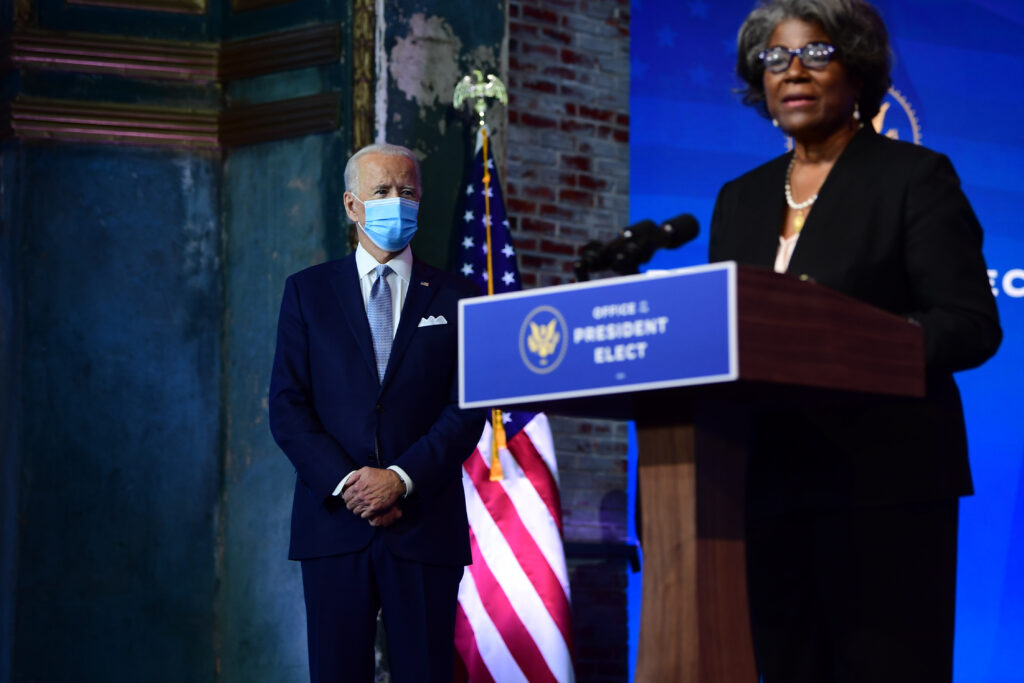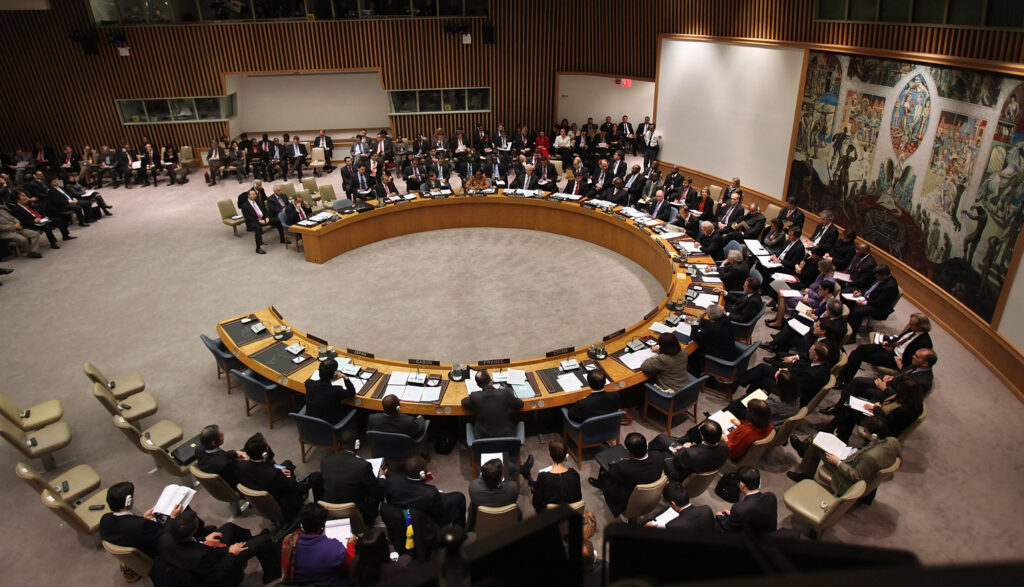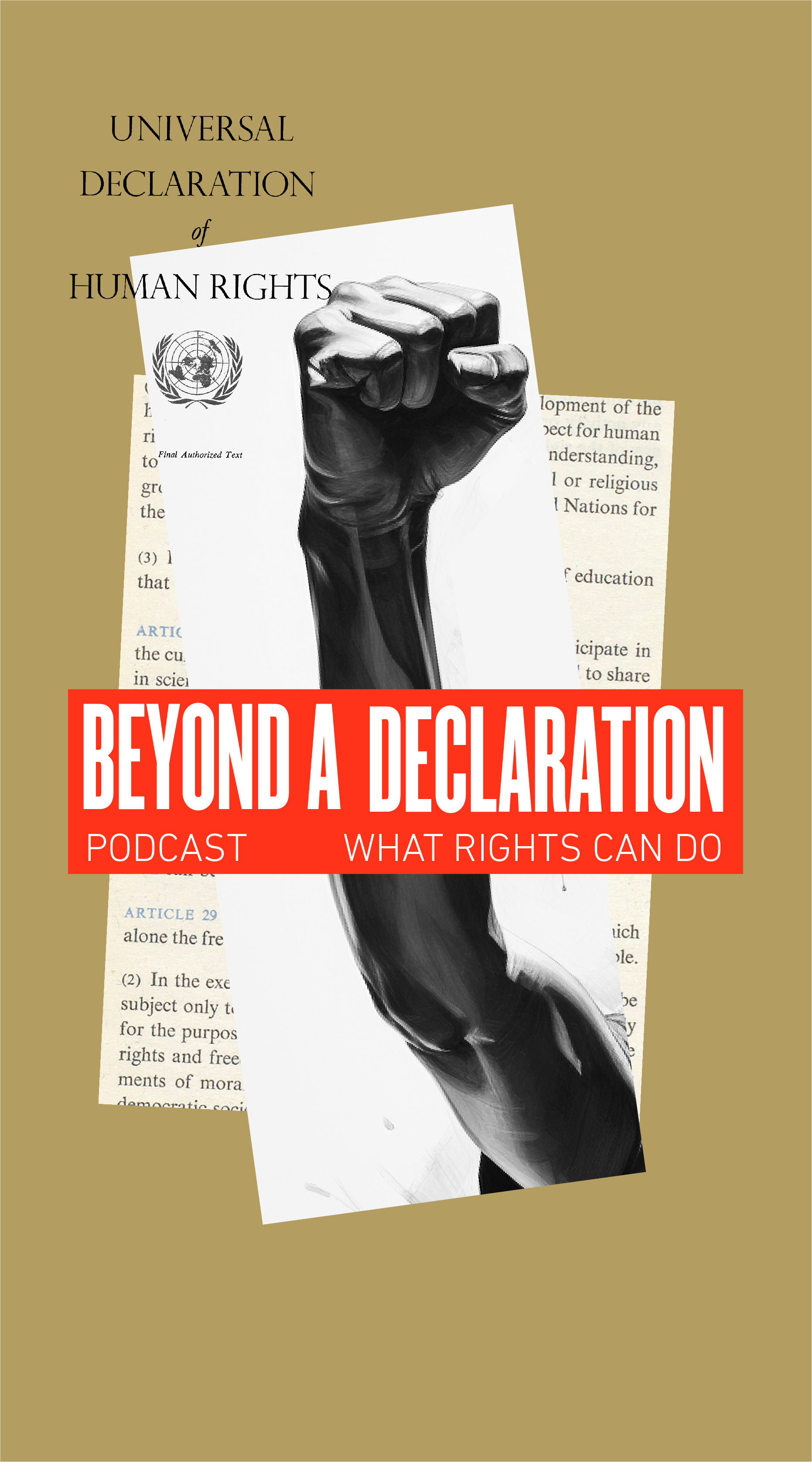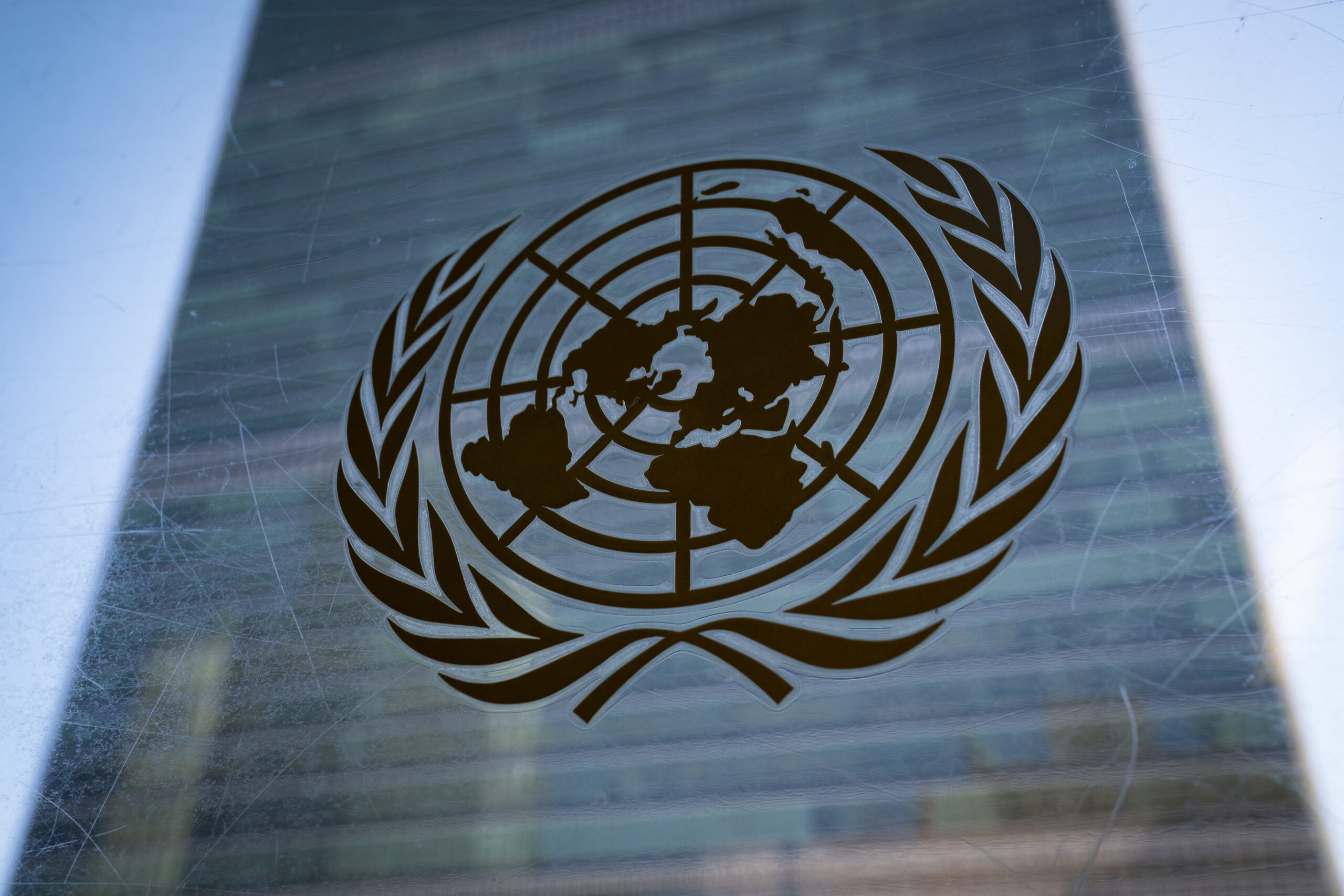This article is part of our series “On the Precipice: A Progressive Agenda in the Biden Era.” Download a PDF of the full series here.
Throughout its history, the United Nations has confronted bureaucratic challenges and radical changes in world politics. The UN has reinvented itself several times and thus far survived.
Last year marked the 75th anniversary of the signing of the UN Charter in San Francisco and the treaty’s entry into force on October 24. Long-planned events from June to October 2020 were to celebrate the occasion were held remotely.
What does the aftermath of the COVID-19 pandemic and the resulting global economic meltdown mean for the United Nations? In the smoldering ashes of the Trump administration’s hyper-nationalist foreign policy, will the UN be around to celebrate its centenary?
Forecasts are not in a social scientist’s job description—thus, my reluctance to speculate about the Biden administration. Nonetheless, U.S. citizens and the planet dodged a bullet in November. We could have seen the continued deterioration of international cooperation with the world’s most important political and military power as well as the UN’s largest funder on the sidelines.
The Biden administration clearly will be better for multilateralism. Starting with Franklin D. Roosevelt, Democrats have consistently supported the UN, and Biden’s re-engagement will represent a noticeable return to the multilateral fold. However, it is uncertain how rapidly he can reverse the Trump administration’s “America First” policies. It is possible that not even the end of the Trump era can resuscitate older and more ambitious visions of liberal internationalism and global governance.
It should be relatively easy after the inauguration to reverse some withdrawals from international organizations and agreements—the World Health Organization (WHO), the Paris Agreement on Climate Change, and perhaps the Iran deal—and restore relations with allies, especially in Europe and the North Atlantic Treaty Organization (NATO). In the medium-term, we should see a return to the Human Rights Council and the UN Educational, Scientific and Cultural Organization (UNESCO), and renewed financing for the family-planning of the UN Population Fund (UNFPA) and for UN Relief and Work Agency for Palestinian Refugees (UNRWA).
Addressing the two most urgent crises facing the United States and every other country in the world, the pandemic and climate change, will require genuine cooperation. In short, while multilateralism was not something Trump did, ever, a multilateral phoenix will have to rise from the last administration’s ashes if we are to make headway against these existential threats.
History contains clues about how best to prepare the UN for an uncertain future; even with the ouster of Donald Trump, multilateralism of all stripes is under siege amidst new nationalisms. With obvious weaknesses on display, including disjointed responses to COVID-19, this essay returns to January 1942. It then parses the Trump administration’s populism and the havoc created at the UN, the effects of which are likely to be long-lasting unless overdue institutional reforms become a reality.
Back to the Future
We should begin with the beginning. The creation of the “United Nations” was not in San Francisco in June 1945, but rather in Washington, D.C., on 1 January 1942, when 26 (and later 47) countries signed the Declaration by United Nations. Most observers are unaware that the label for the military alliance to defeat fascism entailed a commitment to multilateralism as the standard war-time operating procedure; it also was to guide post-war peace and prosperity through an institution with the same name. The 1940s in many ways represented the pinnacle of global intergovernmental governance.
The UN’s 75th birthday should have called attention to the 1942-1945 United Nations Alliance. The end of World War II—like World War I and the Napoleonic wars—spawned an experiment in international organization; rampant nationalism and going-it-alone were exposed as empty vessels. Today, armed conflicts no longer are the only or even the main threats to international order that require cooperation; COVID-19 and climate change are the latest on a list of intractable problems, which also includes terrorism, weapons of mass destruction, and economic instability.
What could be more obvious than the fundamental disconnects between a growing number of global challenges and the inadequate structures for international problem-solving and decision-making? We have occasional, tactical, short-term, and local views and responses instead of sustained, strategic, long-term, and global perspectives and actions.
Why should the Biden administration revisit 1942-1945? Because almost no one questions the effort made by the United States and its Allies, not even my-country-firsters. Examining the war-time United Nations contradicts the conventional wisdom that liberalism was abandoned to confront the Nazis and Imperial Japan; Kantian ideals were essential to the Hobbesian objective of state survival.
A proverbial bottom-line was applicable then and now: when governments use intergovernmental organizations, they work. If global problems require global solutions, history suggests that we require strengthened intergovernmental organizations, especially those of the UN system. An urgent task for the Biden administration is to reinforce the crumbling foundations.
Would the World Be Better without the UN?
Where might we find ourselves today had the United Nations not been created?
It is worth honestly asking, as I did in a 2018 book, “Would the world be better without the UN?” In addressing skeptics who see the world organization more as a waste than an essential component of improved global order, the historical record illustrates both achievements and shortcomings for international peace and security; human rights and humanitarian action, and sustainable development. The unrealized potential of the UN system reflects a past record of having kept the lid on conflict cauldrons, eliminated smallpox, delivered life-saving assistance in war zones, and spawned useful development ideas and projects.
While the UN’s performance often disappoints, its contributions to world order are nonetheless substantial. Indeed, it has become so much a part of today’s international system that the UN is taken for granted. The danger of sliding toward marginalization was ever more evident following the election of Trump, a man intent on destroying the rules-based international order for which the United Nations is a keystone, an order that the United States, despite lapses and inconsistencies, has championed and sustained. He failed to deliver on many domestic promises; but on undermining the post-war order, Trump took huge strides. In the midst of COVID-19, after years of routinely sneering at international cooperation, Washington’s threat to withdraw from the WHO was his final foray in the siege on multilateralism. In his zero-sum ideology, partners and allies were for dummies. Sustained collaboration for mutual benefit was not something Trump believes in.

Multilateralism was totally absent in the November 2018 mid-term elections as it had been in the 2016 presidential campaign, in debates among Democratic aspirants, and in the so-called debates between Trump and Biden. However, it simply has to become a top priority for the Biden administration. There are comforting signs from the president-elect, who has devoted considerable energy to foreign policy and warm relations with friends and even with enemies. The key foreign policy appointments, including the nomination of respected career diplomat Linda Thomas-Greenfield as UN ambassador, indicate that a modicum of optimism is justified.
Value for Money?
The 2020 General Assembly was, thankfully, the last appearance by the former reality-TV star on the world’s biggest stage. However, the “Age of Trump” will continue to loom large, internationally as well as domestically. Alas, the 45th president was not one of a kind; nativist, populist, autocratic leaders can be found the world over. The range of values on display in the UN and other international organizations is wider and more hostile than in the past.
Amid the chaos of scandals and a failed impeachment, the attacks on multilateralism were often ignored, but they should not have been. There are many candidates for the most bizarre example of Trump’s short-sightedness. Until the decision to halt funding to the World Health Organization in the midst of the pandemic, my personal favorite had been the announced threat in October 2018 to withdraw from the Universal Postal Union (UPU), which since 1874 apparently had been threatening U.S. sovereignty and interests by fixing international postal rates.
Still, we must tally the damage from the UN’s most important member state and largest funder. Among his first acts after the inauguration in January 2017 was cutting UNFPA funding and at year’s end withdrawing completely from UNESCO. What happened in between? Pulling out of the Paris Agreement and cancelling the commitment to the Green Climate Fund despite four, now six, consecutive years of record-setting temperatures and natural catastrophes; and pulling out of the Global Compact on Migration. There followed the veto of a Security Council resolution questioning the wisdom of recognizing Jerusalem as Israel’s capital. When the General Assembly agreed, the administration halted its remaining contribution to UNRWA.
The year 2018 was as negative for multilateralism. Washington withdrew from the “biased cesspool” (then UN permanent representative Nikki Haley’s words) of the Human Rights Council after having ripped up the P5+1 Iran deal facilitated by the UN; it then eliminated funding for UNRWA along with threatening the UPU. Indeed, one of the most chilling speeches of 2018 was Secretary of State Mike Pompeo’s remarks at the German Marshall Fund in December in which even the U.S.-dominated World Bank and International Monetary Fund were institutions that “corroded” the international system.
An essential concern for the Biden team should be the extent to which China, and to a lesser extent Russia, have benefited from Washington’s retreat from global leadership. Both Beijing and Moscow have long sought to divide the West, but both were able to relax and let the Trump administration drive the wedges.
At the start of the third decade of the 21st century, the UN is the logical location to convene conversations and orchestrate actions to defeat COVID-19 and address climate change, economic crises, terrorism, the proliferation of WMDs, and mass atrocities. To state the obvious, a single country no matter how powerful cannot solve them.
Equally obvious are the UN’s limitations—not only its sovereignty-bound foundations but also its atomized and wasteful operations. We have to ask whether the United Nations can become a more effective mechanism to pool efforts in a world of sovereign states. The waste and lack of synergy in the UN bureaucracy and the system’s organizations have been detailed by high-level panels, international commissions, academic treatises, and the media. They emphasize the fragmentation of the so-called UN system and turf-wars over scarce resources.
Trying to reform the UN has been an ongoing task since the ink dried on the Charter in 1945. Efforts seemingly never cease to make it more inclusive, transparent, and accountable. Criticism of the organization has been growing, and not only in Washington. The fall-out from the pandemic will not increase confidence in intergovernmental organizations; powerful and less powerful countries and their publics appear increasingly skeptical about their efficacy. Previously sympathetic governments—even the Nordics—are asking tough questions about costs and benefits. They are distancing themselves from international organizations that they long have automatically financed. In brief, the multilateral narrative has less visceral appeal than in 1945, or even a few years ago.

Could UN Secretary-General António Guterres use the Trump administration’s tightening of financial screws to pursue long overdue change under the Biden administration? Could Guterres, or his successor, move toward emphasizing the UN’s comparative advantages, centralizing operations, and trimming bureaucracy? Could part of his pitch for what will undoubtedly be a second mandate involve substantial proposals and actions rather than the marginal ones made to date? We must hope that he rediscovers the fortitude not to shy away from the Sisyphean task of “transforming” the way that the UN does business. If not, we could have a real-time test of my proposition that the world could be even worse-off without the world body.
Conclusion
I conclude with the oft-cited but still meaningful quip attributed to Dag Hammarskjöld: “The UN was not created to take mankind to heaven, but to save humanity from hell.” The United Nations is one reason that we are not in the netherworld already. Yet, a world without it is not impossible if current political conditions continue or deteriorate.
The United Nations arose from the literal ashes of World War II. Can it rise phoenix-like from the figurative ashes of four years of the Trump administration’s efforts to destroy the foundations of the rules-based international order?
“We are calling for a great reawakening of nations,” is how Donald Trump concluded his 2017 General Assembly remarks. He overlooked the fact that the United States helped to create the world organization to curb the demonstrated horrors of nations and nationalism run amok.
President Biden and other heads of state at the 2021 assembly, and the rest of us, should call for a great reawakening of the United Nations.
Thomas G. Weiss is Presidential Professor of Political Science at The CUNY Graduate Center and Director Emeritus of the Ralph Bunche Institute for International Studies. He is also Co-Chair, Cultural Heritage at Risk Project, J. Paul Getty Trust; Distinguished Fellow, Global Governance, at the Chicago Council on Global Affairs; and Eminent Scholar at Kyung Hee University, Korea. The Carnegie Corporation of New York supported research for his latest (2018, Polity Press) authored book, Would the World Be Better without the UN? His next book is The “Third” UN: How a Knowledge Ecology Helps the UN Think (2021, Oxford University Press, with Tatiana Carayannis).



